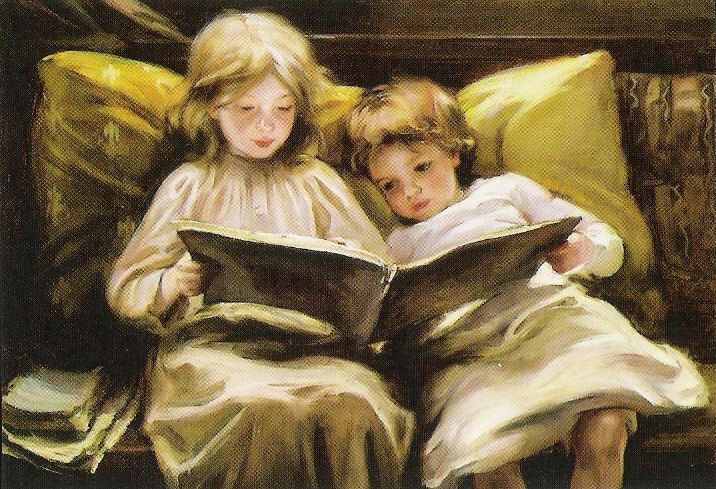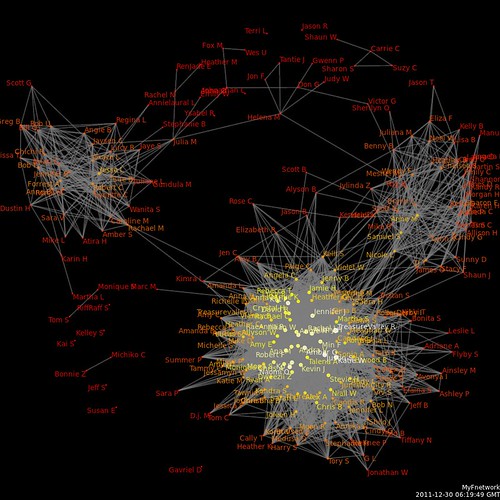I’m delighted to be invited to participate in this project from afar – a small town in Minnesota, USA, to be all geocoordinated about it. I’m just starting a year-long project to explore digital reading networks, so this site feels like home. But I am putting the stress in a slightly different place than some of the contributors here. I’m not looking at reading digitally as opposed to on paper or at the affordances of digital texts (except as a medium for sharing what I learn). Rather, I’m thinking about digital networks devoted to reading. That probably has some geocoordinates of its own; living in a small town makes it a bit challenging to find people who enjoy reading the same books I do. But on the Internet, everyone knows I’m a mystery addict.
I thought I’d start with a bit of my own literacy narrative. My mother was a great reader and was particularly fond of mysteries. She didn’t have the opportunity to finish high school, as a child of the

Depression and the breadwinner for her family at an early age after her father died. Reading was her education. I picked up a taste for mysteries by literally picking up some of her favorites – chiefly Golden Age British mysteries, with the occasional contemporary writer thrown in with some Dickens and Trollope and Jane Austen in the mix. For someone with so little formal education, she was our walking encyclopedia. She could translate bits of Latin, knew historical dates, could explain all sorts of -isms, putting them in social and historical context, and she constantly corrected the grammar and word choices of television newscasters. But if you asked her about history or how to spell a word, she was likely to tell you to look it up. She was a great believer in looking things up.
In late adolescence my reading tastes took a darker turn and, having fallen hard for Dostoevsky, decided to major in Russian literature so I could spend my time reading big, fat novels and discussing them. I missed that kind of discussion later. Even though I found work as a librarian at an undergraduate college, people didn’t discuss books for fun, and what with work and children I wasn’t reading as much as I once did. Then a friend from my undergraduate days mailed me a paperback that she thought I would enjoy – Tony Hillerman’s Listening Woman. She was right. I started looking for reviews of mysteries and developed a small list of authors who I knew I liked and occasionally discovered one by browsing, but I was always slightly pannicked that I would not know what to read next – until I discovered 4MA.
4MA, the common name for 4_Mystery_Addicts, is one of thousands of online reading groups hosted at Yahoo Groups. I heard about it while participating in another online community, Dorothy-L, hosted at Kent State University using Listserv software. A friend I’d made there told me 4MA held regular in-depth book discussions and was more reader-centric. I signed up and was slighlty baffled at first. I was personally welcomed to the group by dozens of members. Various insider jokes were playing out that I couldn’t quite get, and the group was halfway through a discussion of a mystery

that I hadn’t read. My inbox exploded and I wondered what I’d gotten myself into. But I saw that Ken Bruen’s The Guards was up next for discusion and I decided to give it a go.
A few years later, the group moderators asked if I would be willing to join them, and so I got a behind-the-scenes look at the way the group works. The way that the group encouraged book discussion and friendship fascinated me, so I wrote about it for a library publication – partly to encourage librarians involved in reader’s advisory to discover an effective way readers shared recommendations, but largely because it was fascinating to me to see how social reading is.
Since then, quite a lot has changed. Web 2.0 came along, offering different means of socializing. Readers who once used Compuserve and Usenet groups to talk about books could now do so on Facebook and Twitter as well as many other book-focused platforms, most notably Goodreads (now part of the Amazon empire). The norms for social engagement have shifted, not always in a good way. And at 4MA we were reminded that the tight community we’d developed depended on a platform over which we had no control. A recent redesign upset many Yahoo Groups users, as it seemed to have broken most of its functions in order to look more like Facebook and Google+. The fact that the change was named “neo” doesn’t warm my heart. “Liberal” keeps slipping in after it in my mind, and it rather fits the underlying theology of social media, something I thought Alice Marwick described interestingly in her ethnography of Silicon Valley, Status Update.
What I’m hoping to do this year is to capture some of the history of these online reading communities from participants before those memories are lost, look at how new communities are forming through social media, and see what these social interactions can tell us about readers in a world where “social” has multiple conflicting meanings.